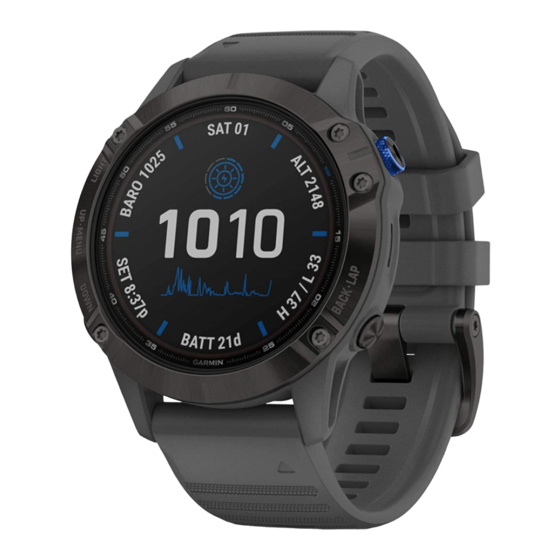- ページ 6
見る Garmin fenixのPDF オーナーズマニュアルをオンラインで閲覧またはダウンロードできます。Garmin fenix 22 ページ。 Turn on smart watch of 2022 - go wiki
Garmin fenix にも: オーナーズマニュアル (18 ページ), スタートマニュアル (4 ページ), クイック・スタート・マニュアル (18 ページ), よくある質問 (5 ページ), ハウツー (8 ページ)

3
Select
.
4
Select
.
NOTE: Your body temperature affects the temperature
sensor. To get the most accurate temperature reading,
remove the device from your wrist and wait 20–30 minutes.
TIP: To purchase a tempe™ wireless temperature sensor, go
to www.garmin.com. When you have the tempe paired with
the fēnix
(page
10), you automatically get accurate
temperature readings without having to remove the device
from your wrist.
Turning on a Sensor Mode
The default sensor mode is on demand mode, which offers you
quick access to compass, altimeter, barometer, or temperature
data. You can also put the device in always on mode to display
continuous sensor data.
NOTE: If you have an optional heart rate monitor or speed and
cadence sensor paired with the device, your device can display
continuous heart rate or speed and cadence data.
1
Select the Orange key.
2
Select Setup > Sensors > Mode > Always On.
Acquiring Satellites
Before you can use the GPS navigation features, such as
recording a track, you must acquire satellite signals.
The device may need a clear view of the sky to acquire satellite
signals. The time and date are set automatically based on the
GPS position. To adjust the time settings, see
For more information about GPS, go to
/aboutGPS.
1
Hold
to turn on the device.
2
Select your language (first time only).
3
Select the Orange key.
4
Select Start GPS.
2
page
6.
www.garmin.com
5
Wait while the device locates satellites.
Stopping GPS
1
Select the Orange key.
2
Select Stop GPS.
Going for a Hike
Before you go for a hike, you should charge the device
completely
(page
1), and make sure the profile is hiking
(page
2).
1
Select the Orange key.
2
Select Start GPS.
3
Wait while the device locates satellites.
4
Start hiking.
5
When you want to take a break or pause the device from
tracking, hold
, and select Pause Track.
6
To resume tracking, hold
7
To save your hiking data, hold
8
If necessary, select Yes to stop GPS.
Sending Your Hike to BaseCamp™
Before you can send data to BaseCamp, you must download
BaseCamp to your computer (www.garmin.com/basecamp).
You can view your hike, other tracks, and waypoints on your
computer.
1
Connect your device to your computer using the USB cable.
Your device appears as a removable drive in My Computer
on Windows ® computers and as a mounted volume on
Mac ® computers.
2
Start BaseCamp.
3
Follow the on-screen instructions.
Profiles
Profiles are a collection of settings that optimize your device
based on how you are using it. For example, the settings and
views are different when you are using the device when hiking
than when mountain biking.
When you are using a profile and you change settings such as
data fields or units of measurement, the changes are saved
automatically as part of the profile.
Changing Profiles
When you change activities, you can quickly change the setup
of the device to suit the activity by changing the profile.
1
Select the Orange key.
2
Select Profiles.
3
Select a profile.
The profile you selected is now the active profile. Any changes
you make are saved to the active profile.
Creating a Custom Profile
You can customize your settings and data fields for a particular
activity or trip.
1
Select the Orange key.
2
Select Setup > Profiles.
3
Select an option:
• Select a profile.
• Select Create New, and select the new profile.
The profile you selected is now the active profile. The
previous profile was saved.
4
If necessary, select Edit, and edit the name of the profile.
5
Customize your settings
active profile.
, and select Resume Track.
, and select Save Track.
(page
7) and data fields for the
Introduction
